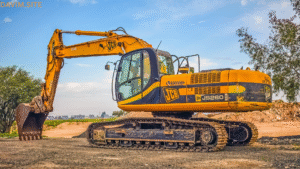Becoming a heavy equipment operator would be ideal for you whether your dream job is in construction or you have always been enthralled with big machines. But generally before exploring, one crucial question arises: “How much does a heavy equipment operator make?” From typical wages and regional variances to the highest-paying sectors and how to boost your income, this article addresses what you need to know about heavy equipment operator compensation.
What Does a Heavy Equipment Operator Do?
Operating machines used in construction, mining, roadwork, and other infrastructure operations falls to a heavy equipment operator. Among them are graders, cranes, excavators, loaders, and bulldozers. Operators shape the physical world we live in; they physically move the ground to create bridges, buildings, roads, and more.
Average Heavy Equipment Operator Salary in 2025
According to the latest data from the U.S. Bureau of Labor Statistics (BLS) and industry sources, the average heavy equipment operator salary in 2025 is approximately $58,000 to $68,000 per year. This equates to about $27 to $32 per hour, depending on the region, experience level, and the type of machinery operated.
Here’s a breakdown:
-
Entry-Level: $40,000 – $48,000 per year
-
Mid-Level (5–10 years of experience): $55,000 – $65,000 per year
-
Experienced Operators (10+ years): $70,000 – $90,000+ per year
Hourly Wage Breakdown
-
Low Range: $20 – $25 per hour
-
Average: $27 – $32 per hour
-
High Range: $35 – $45+ per hour (especially for union jobs and hazardous conditions)
Top-Paying States for Heavy Equipment Operators
Salaries for heavy equipment operators can vary significantly based on location. Typically, states with higher construction demand and cost of living offer better pay.
Top 5 Highest Paying States in 2025:
| State | Average Annual Salary | Average Hourly Wage |
|---|---|---|
| California | $78,000 | $37.50 |
| Alaska | $75,000 | $36.00 |
| New York | $72,000 | $34.50 |
| Washington | $70,000 | $33.50 |
| Illinois | $68,000 | $32.50 |
States like Texas, Florida, and Georgia also offer solid pay with increasing opportunities due to infrastructure development projects.
Heavy Equipment Operator Salary by Industry
Different industries compensate operators based on skill, demand, and machine complexity.
| Industry | Average Salary |
|---|---|
| Construction (Commercial & Residential) | $60,000 |
| Oil & Gas Extraction | $70,000 |
| Mining | $72,000 |
| Highway & Bridge Construction | $65,000 |
| Government (Municipal or Federal) | $62,000 |
Mining and oil & gas are among the highest-paying sectors due to the complexity and risks involved.
Union vs. Non-Union Jobs
One key factor in determining your salary as a heavy equipment operator is whether you’re working a union job or not.
-
Union Operators often earn 15–25% more than non-union counterparts.
-
Unions also offer benefits like health insurance, retirement plans, and job security.
What Influences Heavy Equipment Operator Salaries?
Several factors can influence how much you earn:
1. Experience and Certification
The more experienced you are, the more valuable you become. Certifications in operating multiple types of machinery can increase your pay potential.
2. Type of Machinery Operated
Operators who can handle cranes, large excavators, or graders often earn more than those operating smaller or more basic machines.
3. Work Environment
Jobs in hazardous or remote locations (e.g., mines or offshore rigs) typically offer hazard pay, significantly boosting income.
4. Education & Licensing
While a high school diploma is often enough, completing a training program or apprenticeship can lead to better job opportunities and salaries.
How to Become a High-Earning Heavy Equipment Operator
Here are actionable steps to boost your earning potential in this career:
1. Enroll in an Accredited Training Program
Completing a training program from a reputable vocational school or technical institute is one of the quickest ways to enter the field.
2. Get Certified
Certifications like those from the National Commission for the Certification of Crane Operators (NCCCO) or OSHA safety training are valuable assets.
3. Join a Union
Being part of a union like the International Union of Operating Engineers (IUOE) can lead to higher pay, better benefits, and stronger job security.
4. Gain Specialized Skills
Learn to operate multiple types of heavy machinery, especially high-demand ones like tower cranes or tunnel boring machines.
5. Relocate for Higher Pay
If you’re willing to move, consider areas with high construction demand like California, Alaska, or New York for better wages.
Heavy Equipment Operator Salary Compared to Similar Jobs
How does this career stack up against others in construction?
| Job Title | Average Salary |
|---|---|
| Heavy Equipment Operator | $65,000 |
| Crane Operator | $70,000 – $90,000 |
| Truck Driver | $55,000 |
| Construction Laborer | $45,000 |
| Diesel Mechanic | $58,000 |
As you can see, heavy equipment operators fall on the higher end of the spectrum, especially when operating complex machinery.

Job Outlook for Heavy Equipment Operators
The BLS projects that the employment market for heavy equipment operators will rise by 5% through 2030. Rising infrastructure spending, urban development, and commercial building all help to explain this increase.
Major projects like bridges, energy pipelines, and roadways will keep demand high. Particularly sought for will be those with advanced credentials and experience.
Pros and Cons of a Heavy Equipment Operator Career
Pros:
-
Strong earning potential with minimal formal education
-
Variety of work environments (indoor, outdoor, rural, urban)
-
Opportunities for overtime and hazard pay
-
High job satisfaction from tangible results
Cons:
-
Physically demanding work
-
Exposure to weather and hazardous conditions
-
Need for constant vigilance and safety awareness
-
Irregular work hours, especially during peak seasons
Conclusion: Is It Worth Becoming a Heavy Equipment Operator in 2025?
Right. Becoming a heavy equipment operator is still a good and fulfilling career option with excellent beginning income, development prospects, and quite minimal educational obstacles. Understanding the salary landscape can help you negotiate higher compensation and make informed decisions whether you are looking to change jobs or entering the field.
Investing in appropriate training, qualifications, and constant adaptation can help you greatly increase your heavy equipment operator pay and start a long-term career in a sector in high demand.
